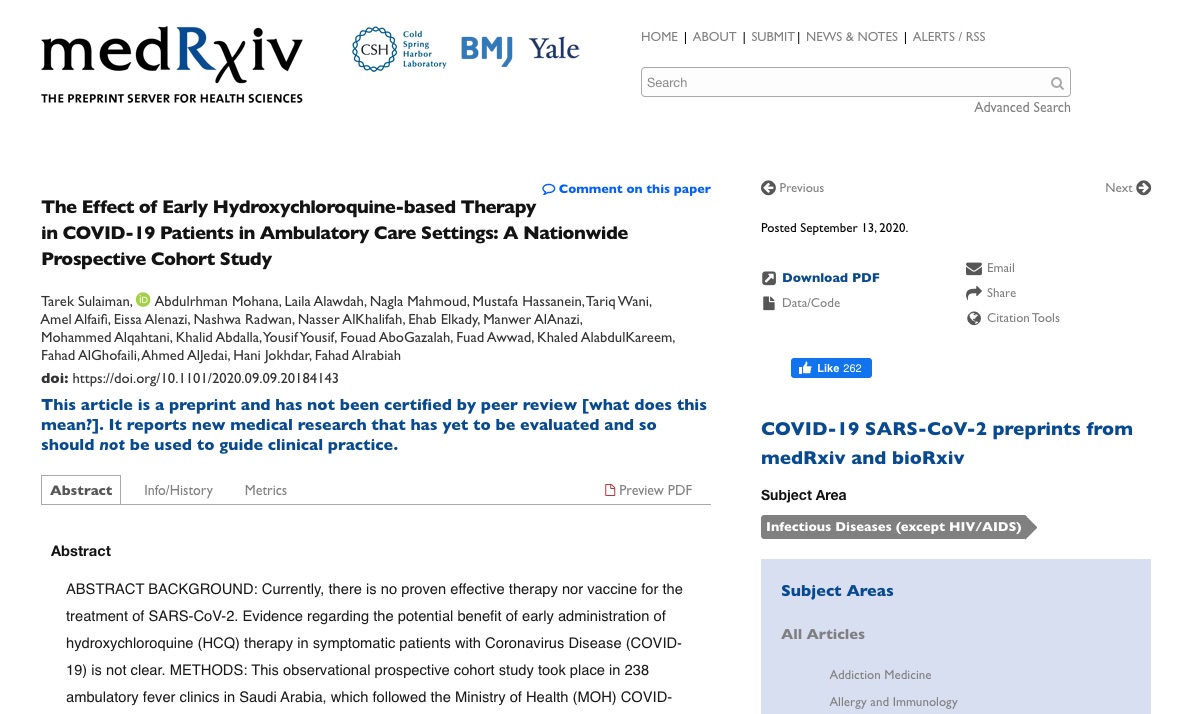Source: MedRxiv
Tarek Sulaiman, View ORCID ProfileAbdulrhman Mohana, Laila Alawdah, Nagla Mahmoud, Mustafa Hassanein, Tariq Wani, Amel Alfaifi, Eissa Alenazi, Nashwa Radwan, Nasser AlKhalifah, Ehab Elkady, Manwer AlAnazi, Mohammed Alqahtani, Khalid Abdalla, Yousif Yousif, Fouad AboGazalah, Fuad Awwad, Khaled AlabdulKareem, Fahad AlGhofaili, Ahmed AlJedai, Hani Jokhdar, Fahad Alrabiah
doi: https://doi.org/10.1101/2020.09.09.20184143
Abstract
ABSTRACT BACKGROUND: Currently, there is no proven effective therapy nor vaccine for the treatment of SARS-CoV-2. Evidence regarding the potential benefit of early administration of hydroxychloroquine (HCQ) therapy in symptomatic patients with Coronavirus Disease (COVID-19) is not clear.
METHODS: This observational prospective cohort study took place in 238 ambulatory fever clinics in Saudi Arabia, which followed the Ministry of Health (MOH) COVID-19 treatment guideline. This guideline included multiple treatment options for COVID-19 based on the best available evidence at the time, among which was Hydroxychloroquine (HCQ).
Patients with confirmed COVD-19 (by reverse transcriptase polymerase chain reaction (PCR) test) who presented to these clinics with mild to moderate symptoms during the period from 5-26 June 2020 were included in this study.
Our study looked at those who received HCQ-based therapy along with supportive care (SC) and compared them to patients who received SC alone.
The primary outcome was hospital admission within 28-days of presentation. The secondary outcome was a composite of intensive care admission (ICU) and/or mortality during the follow-up period.
Outcome data were assessed through a follow-up telephonic questionnaire at day 28 and were further verified with national hospitalisation and mortality registries. Multiple logistic regression model was used to control for prespecified confounders.
RESULTS: Of the 7,892 symptomatic PCR-confirmed COVID-19 patients who visited the ambulatory fever clinics during the study period, 5,541 had verified clinical outcomes at day 28 (1,817 patients in the HCQ group vs 3,724 in the SC group).
At baseline, patients who received HCQ therapy were more likely to be males who did not have hypertension or chronic lung disease compared to the SC group. No major differences were noted regarding other comorbid conditions.
All patients were presenting with active complaints; however, the HCQ groups had higher rates of symptoms compared to the SC group (fever: 84% vs 66.3, headache: 49.8 vs 37.4, cough: 44.5 vs 35.6, respectively).
Early HCQ-based therapy was associated with a lower hospital admission within 28-days compared to SC alone (9.4% compared to 16.6%, RRR 43%, p-value <0.001). The composite outcome of ICU admission and/or mortality at 28-days was also lower in the HCQ group compared to the SC (1.2% compared to 2.6%, RRR 54%, p-value 0.001).
Adjusting for age, gender, and major comorbid conditions, a multivariate logistic regression model showed a decrease in the odds of hospitalisation in patients who received HCQ compared to SC alone (adjusted OR 0.57 [95% CI 0.47-0.69], p-value <0.001).
The composite outcome of ICU admission and/or mortality was also lower for the HCQ group compared to the SC group controlling for potential confounders (adjusted OR 0.55 [95% CI 0.34-0.91], p-value 0.019).
CONCLUSION: Early intervention with HCQ-based therapy in patients with mild to moderate symptoms at presentation is associated with lower adverse clinical outcomes among COVID-19 patients, including hospital admissions, ICU admission, and/or death.
Competing Interest Statement
The authors have declared no competing interest.
Clinical Trial
The current study is an observational prospective cohort rather than an interventional trial. The decision to prescribe HCQ or not was purely at the providers discretion in agreement with the patients after assessing and discussing the risks and benefits of the therapy. Based on the best available evidence at the time, the Saudi Ministry of Health released a treatment guideline recommendation which listed HCQ as a treatment option in mild to moderate presentations of COVID-19. Our study was designed to prospectively follow a predefined population who presented with mild-moderate disease and eventually were confirmed to have COVID-19 and look at the differences in the stated outcomes between those who received HCQ compared to those who did not receive any antiviral medication. This cohort study was registered at the Saudi Food and Drug Authority (Registration Number 20090704)”
Clinical Protocols
https://www.moh.gov.sa/en/Ministry/MediaCenter/Publications/Pages/covid19.aspx
Funding Statement
This work was conducted under the umbrella of the Saudi Arabian Ministry of Health. No external funds were required
Author Declarations
I confirm all relevant ethical guidelines have been followed, and any necessary IRB and/or ethics committee approvals have been obtained.
Yes
The details of the IRB/oversight body that provided approval or exemption for the research described are given below:
Saudi Arabia Ministry of Health IRB Saudi Food and Drug Authority national registry
All necessary patient/participant consent has been obtained and the appropriate institutional forms have been archived.
Yes
I understand that all clinical trials and any other prospective interventional studies must be registered with an ICMJE-approved registry, such as ClinicalTrials.gov. I confirm that any such study reported in the manuscript has been registered and the trial registration ID is provided (note: if posting a prospective study registered retrospectively, please provide a statement in the trial ID field explaining why the study was not registered in advance).
Yes
I have followed all appropriate research reporting guidelines and uploaded the relevant EQUATOR Network research reporting checklist(s) and other pertinent material as supplementary files, if applicable.
Yes
Hydroxychloroquine Reduces Risk Of Death From COVID-19 By 30%, Latest Italian Study Shows

